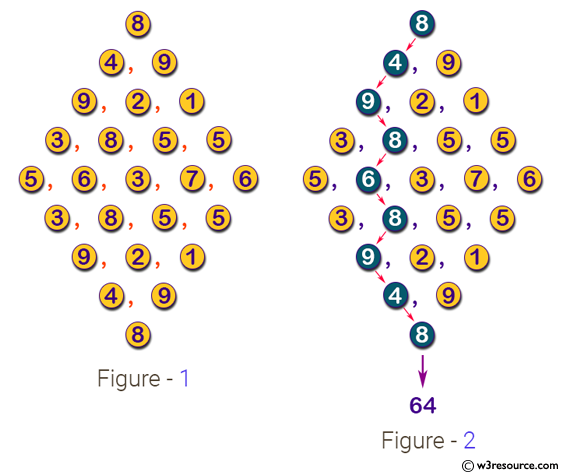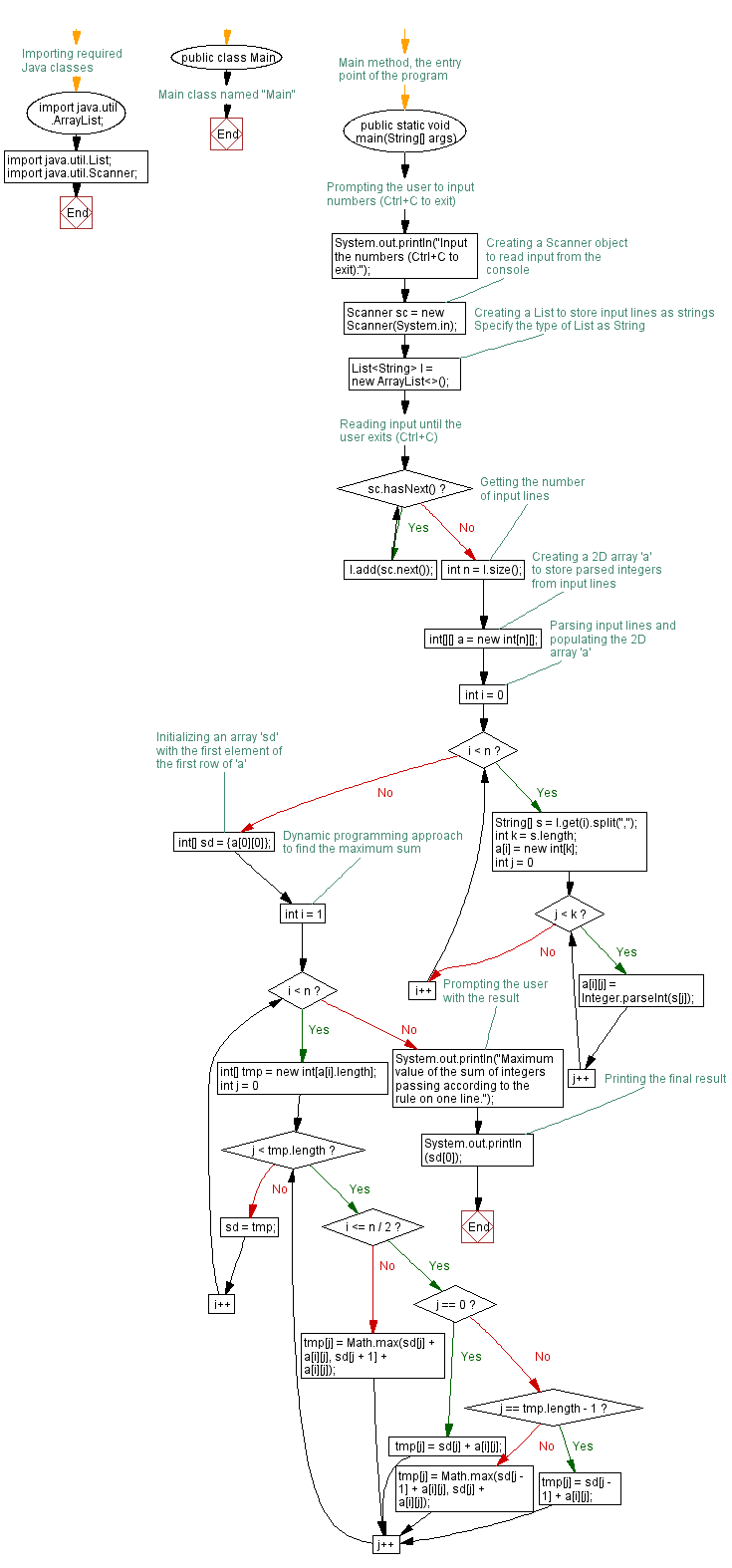Java: Compute the maximum value of the sum of the passing integers
Maximum Path Sum from Hilltop Data
As shown in Figure 1, arrange integers (0 to 99) as narrow hilltops. When reading such data from top to bottom, following the next rule represents a huge amount of data.
Write a Java program that computes the maximum value of the sum of the passing integers.
Input:
A series of integers separated by commas are given in diamonds. No spaces are included in each line. The input example corresponds to Figure 1. The number of lines of data is less than 100 lines.
Output: The maximum value of the sum of integers passing according to the rule on one line.
Visual Presentation:

Sample Solution:
Java Code:
// Importing required Java classes
import java.util.ArrayList;
import java.util.List;
import java.util.Scanner;
// Main class named "Main"
public class Main {
// Main method, the entry point of the program
public static void main(String[] args) {
// Prompting the user to input numbers (Ctrl+C to exit)
System.out.println("Input the numbers (Ctrl+C to exit):");
// Creating a Scanner object to read input from the console
Scanner sc = new Scanner(System.in);
// Creating a List to store input lines as strings
List<String> l = new ArrayList<>(); // Specify the type of List as String
// Reading input until the user exits (Ctrl+C)
while(sc.hasNext()) {
l.add(sc.next());
}
// Getting the number of input lines
int n = l.size();
// Creating a 2D array 'a' to store parsed integers from input lines
int[][] a = new int[n][];
// Parsing input lines and populating the 2D array 'a'
for(int i = 0; i < n; i++) {
String[] s = l.get(i).split(",");
int k = s.length;
a[i] = new int[k];
for(int j = 0; j < k; j++) {
a[i][j] = Integer.parseInt(s[j]);
}
}
// Initializing an array 'sd' with the first element of the first row of 'a'
int[] sd = {a[0][0]};
// Dynamic programming approach to find the maximum sum
for(int i = 1; i < n; i++) {
int[] tmp = new int[a[i].length];
for(int j = 0; j < tmp.length; j++) {
if(i <= n / 2) {
if(j == 0) tmp[j] = sd[j] + a[i][j];
else if(j == tmp.length - 1) tmp[j] = sd[j - 1] + a[i][j];
else tmp[j] = Math.max(sd[j - 1] + a[i][j], sd[j] + a[i][j]);
}
else {
tmp[j] = Math.max(sd[j] + a[i][j], sd[j + 1] + a[i][j]);
}
}
sd = tmp;
}
// Prompting the user with the result
System.out.println("Maximum value of the sum of integers passing according to the rule on one line.");
// Printing the final result
System.out.println(sd[0]);
}
}
Sample Output:
Input the numbers (ctrl+c to exit): 8 4,9 9,2,1 3,8,5,5 5,6,3,7,6 3,8,5,5 9,2,1 4,9 8 Maximum value of the sum of integers passing according to the rule on one line. 64
Flowchart:

For more Practice: Solve these Related Problems:
- Write a Java program to compute the maximum path sum in a diamond-shaped number grid.
- Write a Java program to calculate the maximum sum path in a triangular hilltop dataset using dynamic programming.
- Write a Java program to find the maximum path sum in a hilltop grid where each move can be diagonally left or right.
- Write a Java program to compute the maximum sum path in a hilltop data structure even when negative numbers are present.
Go to:
PREV : Extract Words of Length 3 to 6 from Sentence.
NEXT : Count Combinations Satisfying Sum of Variables.
Java Code Editor:
Contribute your code and comments through Disqus.
What is the difficulty level of this exercise?
Test your Programming skills with w3resource's quiz.
